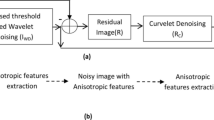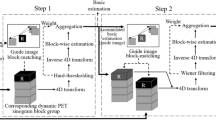Abstract
Purpose
Partial volume effects (PVEs) are consequences of the limited resolution of emission tomography. The aim of the present study was to compare two new voxel-wise PVE correction algorithms based on deconvolution and wavelet-based denoising.
Materials and methods
Deconvolution was performed using the Lucy-Richardson and the Van-Cittert algorithms. Both of these methods were tested using simulated and real FDG PET images. Wavelet-based denoising was incorporated into the process in order to eliminate the noise observed in classical deconvolution methods.
Results
Both deconvolution approaches led to significant intensity recovery, but the Van-Cittert algorithm provided images of inferior qualitative appearance. Furthermore, this method added massive levels of noise, even with the associated use of wavelet-denoising. On the other hand, the Lucy-Richardson algorithm combined with the same denoising process gave the best compromise between intensity recovery, noise attenuation and qualitative aspect of the images.
Conclusion
The appropriate combination of deconvolution and wavelet-based denoising is an efficient method for reducing PVEs in emission tomography.







Similar content being viewed by others
References
Kato H, Shimosegawa E, Oku N, Kitagawa K, Kishima H, Saitoh Y, et al. MRI-based correction for partial volume effect improves detectability of intractable epileptogenic foci on 123I-iomazenil brain SPECT images. J Nucl Med 2008;49:383–9.
Kalpouzos G, Chetelat G, Baron JC, Landeau B, Mevel K, Godeau C, et al. Voxel-based mapping of brain gray matter volume and glucose metabolism profiles in normal aging. Neurobiol Aging 2009;30:112–24.
Mevel K, Desgranges B, Baron JC, Landeau B, De la Sayette V, Viader F, et al. Detecting hippocampal hypometabolism in Mild Cognitive Impairment using automatic voxel-based approaches. Neuroimage 2007;37(1):18–25.
Samuraki M, Matsunari I, Chen WP, Yajima K, Yanase D, Fujikawa A, et al. Partial volume effect-corrected FDG PET and grey matter volume loss in patients with mild Alzheimer’s disease. Eur J Nucl Med Mol Imaging 2007;34(10):1658–69.
Rousset OG, Ma Y, Evans AC. Correction for partial volume effects in PET: principle and validation. J Nucl Med 1998;39(5):904–11.
Rousset OG, Collins DL, Rahmin A, Wong DF. Design and implementation of an automated partial volume correction in PET: application to dopamine receptor quantification in the normal human striatum. J Nucl Med 2008;49:1097–106.
Basu S, Alavi A. Feasibility of automated partial-volume correction of SUVs in current PET/CT scanners: can manufacturers provide integrated, ready-to-use software. J Nucl Med 2008;49:1031–2.
Soret M, Bacharach SL, Buvat I. Partial-volume effect in PET tumor imaging. J Nucl Med 2007;48(6):932–45.
Boussion N, Hatt M, Lamare F, Bizais Y, Turzo A, Cheze-Le Rest C, et al. A multiresolution image based approach for correction of partial volume effects in emission tomography. Phys Med Biol 2006;51(7):1857–76.
Tohka J, Reilhac A. Deconvolution-based partial volume correction in raclopride-PET and Monte Carlo comparison to MR-based method. Neuroimage 2008;39:1570–84.
Teo BK, Seo Y, Bacharach SL, Carrasquillo JA, Libutti SK, Shukla H, et al. Partial-volume correction in PET: validation of an iterative postreconstruction method with phantom and patient data. J Nucl Med 2007;48(5):802–10.
Kirov AS, Piao JZ, Schmidtlein CR. Partial volume effect correction in PET using regularized iterative deconvolution with variance control based on local topology. Phys Med Biol 2008;53:2577–91.
Van Cittert PH. Zum einfluss der spaltbreite auf die intensita tsverteilung in spektrallinien. Z Physik 1931;69:298.
Lucy LB. An iteration technique for the rectification of observed distributions. Astron J 1974;79:745–54.
Richardson WH. Bayesian-based Iterative Method of Image Restoration. J Opt Soc Am 1972;62(1):55–9.
Chang SG, Yu B, Vetterli M. Adaptive wavelet thresholding for image denoising and compression. IEEE Trans Image Process 2000;9(9):1532–46.
Donoho DL. De-noising by soft-thresholding. IEEE Trans Inf Theory 1995;41(3):613–27.
Donoho DL, Johnstone IM. Ideal spatial adaptation via wavelet shrinkage. Biometrika 1994;81:425–55.
Turkheimer FE, Aston JA, Asselin MC, Hinz R. Multi-resolution Bayesian regression in PET dynamic studies using wavelets. Neuroimage 2006;32(1):111–21.
Kalifa J, Laine A, Esser PD. Regularization in tomographic reconstruction using thresholding estimators. IEEE Trans Image Proc 2003;22(3):351–9.
Starck JL, Murtagh F, Bijaoui A. Image processing and data analysis: the multiscale approach. Cambridge: Cambridge University Press; 1998.
Mallat S. A theory for multiresolution signal decomposition: the wavelet representation. IEEE Trans Pattern Anal Mach Intell 1989;11:674–93.
Shensa MJ. Discrete wavelet transform: wedding the à trous and Mallat algorithms. IEEE Trans Signal Proc 1992;40(10):2464–82.
Starck JL, Fadili J, Murtagh F. The undecimated wavelet decomposition and its reconstruction. IEEE Trans Image Proc 2007;16(2):297–309.
Visvikis D, Turzo A, Gouret S, Damien P, Lamare F, Bizais Y, et al. Characterisation of SUV accuracy in FDG PET using 3D RAMLA and the Philips Allegro PET scanner. J Nucl Med 2004;45:103P.
Ramani S, Blu T, Unser M. Monte-Carlo SURE: a black-box optimization of regularization parameters for general denoising algorithms. IEEE Trans Image Proc 2008;17:1540–54.
Author information
Authors and Affiliations
Corresponding author
Rights and permissions
About this article
Cite this article
Boussion, N., Cheze Le Rest, C., Hatt, M. et al. Incorporation of wavelet-based denoising in iterative deconvolution for partial volume correction in whole-body PET imaging. Eur J Nucl Med Mol Imaging 36, 1064–1075 (2009). https://doi.org/10.1007/s00259-009-1065-5
Received:
Accepted:
Published:
Issue Date:
DOI: https://doi.org/10.1007/s00259-009-1065-5




